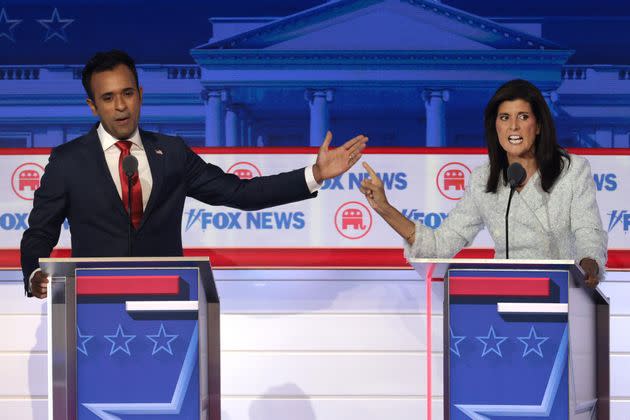Vivek Ramaswamy's Loud Voice Doesn't Resonate With Young Indian Americans
- Oops!Something went wrong.Please try again later.
- Oops!Something went wrong.Please try again later.

Republican presidential candidate Vivek Ramaswamy talks to members of the media in the spin room following the first debate of the GOP primary season, Aug. 23, 2023, in Milwaukee.
As a young Indian American commentator, it’s both exciting and challenging when an Indian American breaks into the national political arena. To date, we’ve seen former Louisiana Gov. Piyush “Bobby” Jindal, Vice President Kamala Harris, and former South Carolina Gov. Nikki Haley run for president. But the reality is that Jindal is a footnote to history, Harris is predominantly perceived as a Black woman first, and Haley is white-passing and has only recently embraced her Indian American identity for this latest presidential bid. Moreover, each of these figures is from a previous generation — coming of age in a very different America than the one inherited by millennials and Gen Z.
Therefore, my interest was piqued when, a few months back, I learned of an Indian American millennial who’d entered the 2024 presidential race out of nowhere. That candidate, Vivek Ramaswamy, burst onto the national political scene last Wednesday at the Republican primary debate.
Though I had already done a deep dive into the right-wing tech bro and culture warrior, I watched Ramaswamy’s debate performance with a unique sense of dread. I hoped the people watching at home knew this was no representation of either my generation or the Indian American community. Ramaswamy, 38, is one of the few high-profile young Indian American political voices, but nearly every word out of his mouth betrays the core values of the demographics he’s invoking for his deeply cynical campaign.
In rallying cries to his fellow Indians to break free from the British Empire, Mahatma Gandhi often cited and drew from the American Revolution. No doubt Ramaswamy, who has centered the “revolution” in his messaging, knows this well. However, unlike Ramaswamy, the vast majority of Indian Americans ― having come of age during or just after Indian Independence in the mid-20th century ― treasure the hard-won privilege of democracy.
At the debate, the biotech entrepreneur fed red meat to the MAGA base, arguing that former President Donald Trump “was the best president of the 21st century” and dismissing urgent threats to democracy both domestically and abroad (e.g. siding with Vladimir Putin’s Russia over Ukraine). In stark contrast, in 2016, a reported 77% of Indian Americans voted for former Secretary of State Hillary Clinton, and in 2020, over 70% of Indian Americans supported the Biden-Harris ticket.
In fact, in response to Trumpism and its anti-immigrant rhetoric, Indian Americans have become increasingly politically engaged in support of progressive policies. As journalist Vidya Krishan explains: “Indian Americans used to be sheltered from America’s racial storm — but then came Trump and COVID-19.”

Ramaswamy and former U.N. Ambassador Nikki Haley participate in the first debate of the GOP presidential primary season.
Unlike the majority of our community, Ramaswamy sees self-opportunity in the modern Republican Party. Not unlike other non-representative, prominent Republicans, Ramaswamy is eager to weaponize his minority identity against other marginalized groups. He is particularly, and viciously, anti-Black. For example, Ramaswamy, who’s written a book mockingly titled “Woke, Inc.” ― a screed against diversity, equality and inclusion efforts and corporate social responsibility ― cheered on the Supreme Court’s recent decision prohibiting affirmative action in college admissions, arguing that a supposed crisis of “fatherlessness”is actually to blame for unequal outcomes for Black Americans.
“I went to public schools through eighth grade. It was racially diverse, majority-Black or something close to it,” Ramaswamy told ABC News’ Linsey Davis in June. “There wasn’t a single one of those Black kids that could not have achieved everything that I have in my life ― I’ve lived the American dream, I’m now running for U.S. president ― if they had also been given the same privilege that I had, which was two parents in the house and a focus on education.”
Ironically, Ramaswamy is inarguably the beneficiary of such DEI and affirmative action policies, having attended Yale Law School on a Paul & Daisy Soros scholarship targeted to “new American” immigrant families.
Just as he exploits his identity as an Indian American immigrant, Ramaswamy also attempted to use the debate to claim the mantle of a next-generation leader. But here, too, his positions were painfully out of step with the young voters he supposedly represents. “I think we do need somebody of a different generation to lead this nation forward,” he said during the Fox News event. Yet despite young voters being more politically engaged than ever, Ramaswamy’s signature domestic policy idea is to raise the voting age to 25.
On issues that matter most to young voters, such as gun violence and climate change, his answers could not have been farther from the mainstream preferences of our demographic. In response to a question about extreme weather wreaking havoc across the country, Ramaswamy declared that “the climate change agenda is a hoax.” He also confirmed to moderator Bret Baier that if elected, he would shut down the Bureau of Alcohol, Tobacco, Firearms and Explosives ― the federal agency that regulates firearms ― in addition to the FBI and the IRS.
As we saw with presidential hopeful Andrew Yang in 2020, limited representation in the national discourse can lead to outlandish or downright wacky figures filling in representation gaps in our politics and media. Ramaswamy comes served up with all the fixings to a political media that is starving for something different from Trump indictments and Hunter Biden investigation pressers ― and surely, there is much more Vivek to come. Therefore, it’s critical that readers, viewers and voters understand that Ramaswamy is an extraordinarily contrived figure who does not resonate with or represent Indian Americans, young voters, or young Indian American voters like me.
